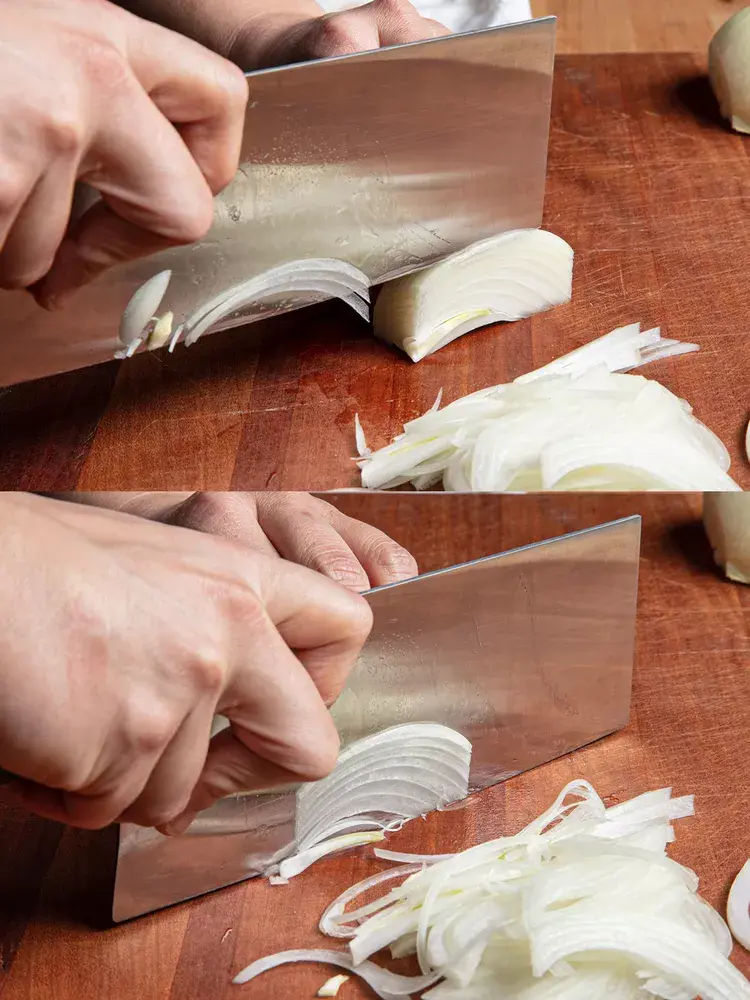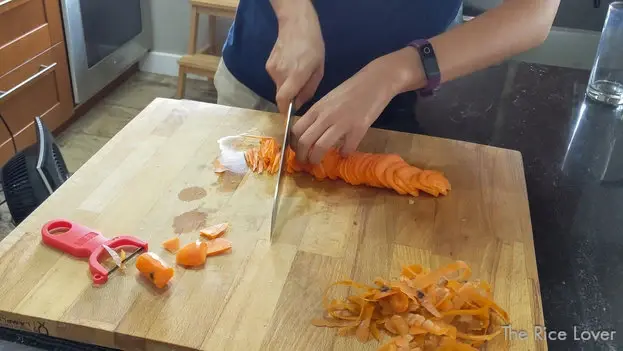Something that changed how you cook, a tip most people don't know or something you discovered yourself. Or even something that you just think is cool.
Learning to use acid as a seasoning has been life changing
A little splash of vinegar or lemon juice can really brighten up something without having to dump in a bunch of salt
That and MSG
If you're cooking anything savory, you put some MSG in it and it instantly gets better
A thousand times this ^. Tajin is also a handy way to add acid with a little bit of added seasoning. It's like a bit of citric acid from dehydrated lime and chili powder.
Also, MSG has a bad rap because some midwestern white woman got a headache from it once and a local news station picked up the story. It's not at all harmful in moderation, billions of people have it in their regular diet.
Yeah, I am speaking hyperbolically on that. I presented it dismissively as a course of some of the stigma that surrounds MSG in certain.... White socal circles. And how local news media loves to pick out a couple of lines from a study and present some conclusion that is wildly off base. Add in a little man on the street interview with leading questions and the bs spreads. My overall point is that it's safe, and there's clearly racist underpinnings to the whole thing.
Can't have white people knowing that there's any flavor beyond ham and potato, ya know?
Apparently, you can buy acids as a powder to use as a dry seasoning. This helps when you're trying to limit liquid content as in a cocktail or puff pastry filling. More info here: https://youtube.com/watch?v=VRCQFwgwLE4
I found a YouTube link in your comment. Here are links to the same video on alternative frontends that protect your privacy:
Get a kitchen scale. When baking, find recipes which go by mass, instead of volume. Shit like flour, brown sugar, bread crumbs, spices etc. have very inconsistent density. You constantly worry about whether or not a teaspoon is supposed to be heaping or flat, whether a cup of brown sugar is supposed to be loose or compressed. Fuck all of that shit. Do it by weight. It will come out perfect every time.
100%
also it makes changing the amount of recipes much easier because you aren't trapped in the bullshit that is the culinary imperial system
goddamn culinary imperialism forcing nonsense measurements into my metric home
Alright comrades, buckle up
-
Blanch your hard vegetables before stir frying. Broccoli, Chinese broccoli, pea pods, even mushrooms. Makes the colours more vibrant, and home stoves rarely reach the heat levels that Chinese professional stoves can reach so you can cook them through. Blanch for 15-60 seconds (depending on how hard/big the vegetable is), run it under cold water in a strainer of some description before throwing it into a stir fry.
-
Specific to shiitake mushrooms, this may be more common knowledge in China, Japan, Korea, etc, but fresh Shiitake should be blanched for 30-60 seconds, cooled under running water then pressed against your strainer to get the excess water out. This gets the "grassy" flavour out. A lot of people who don't like shiitake specifically aren't prepping them correctly.
-
Big chopping boards. Don't cheap out, get a large wooden or plastic chopping board. Medium chopping boards are small, large chopping boards are mid.
-
Have a scrap bin on your work surface. Even if you have a bin you can open with your foot next to you, it'll save time. Just use a bowl or an empty container.
-
Get a Chinese caidao. That's it. You can use it as a bench scraper after cutting whatever you're cutting, a shibazi works well and it's cheap. I'm a cook irl, for a western cafe, and I own one (1) pairing knife and one (1) caidao. While other cooks/chefs own like a set of expensive European knives
-
Don't be afraid of MSG, tell your friends and family not to be afraid of MSG.
-
If you think you've put in the correct amount of garlic, add another 15%
-
Marinades that require over a couple hours are a scam, beyond that it's not worth the effort 90% of the time. Overnight marinades are to food what top sheets are to beds. There's a certain level of flavour penetration extra time can provide to a meat, but after a point it's easier to simply cut it into smaller pieces to allow whatever marinade to coat more of the surface in less than half the time.
-
Sharpen your knives, but don't listen to r/knives or whatever when they tell you to use some expensive meteorite whetstone every other day. I sharpen via stone every... 6 months? And hone with a steel once or twice a day
-
Google how to brunoise an onion. Dicing onions is common across many cuisines, and doing so efficiently will save you more time over the years than practically any other knife skill
-
Pinch grip on your knives. Have the handle in your hand, and pinch the spine of the blade with your thumb and finger (or 2, for larger knives like the caidao)
-
Making your own stock isn't worth the effort most of the time, but when you do make stock, and it's not intended to be a clear stock, add like a dash of soy sauce
-
Steamed rice makes the best fried rice, day old rice makes the second best fried rice, cooked rice layed out in a thin layer over a sheet pan or plate makes the third best fried rice.
-
If you don't have a mortar and pestle, get a garlic crusher.
-
If you do have a mortar and pestle, try crushing things with some coarse salt laid in. For example, if you're crushing basil for a homemade pesto, huge salt flakes help break down the leaves. Doesn't exactly hurt garlic, either.
-
An air fryer is just a small oven, decide for yourself whether or not you eat enough baked goods to warrant purchasing one.
-
Salting your pasta water is better than not salting it. That said, the difference is very minor so most people won't be able to tell the difference. I can barely tell the difference.
-
Asian noodles cook way faster than pasta, if you're used to cooking pasta and you're trying out a noodle recipe, be very careful not to overcook. The reverse is also true: if you're more used to Asian noodles and you're making pasta, start boiling water and cooking before you would normally.
-
Learn to use spice. Straight up adding chili will probably not be a pleasant experience. Umami rounds out the heat (Loads of Chinese styles of chili use this, see: Laoganma chili crisp). Acid cuts through the heat (most American hot sauces I've encountered do this. Tabasco, Frank's, Cholula, Tapatio). Garlic pairs well with heat (Sriracha). This knowledge is the difference between spicelords that eat carolina reapers as a flex and someone who actually enjoys spice.
-
Temperature control is extremely important but is hard to do on electric stoves, so may not be possible to turn heat up or down rapidly. I've made do by having a burner on low and one on high if I have to go between starting the aromatics to cooking the main ingredients.
-
Deep frying at home is only worth it if you do it often, don't buy a deep fryer.
-
Conversely, steaming at home is worth it regardless of if you do it once every 6 months or every day, buy a bamboo steamer that fits over one of your pots. Mainly due to how cheap bamboo is.
-
Dark and light soy aren't remotely the same thing
-
Neutral oils can be seasoned ahead of time. For example, on the lowest setting your stove can go, heat up some neutral oil, roughly chop some scallions and a shallot, drop them into the oil, and fish them out after they darken (if they're blackened, you've gone too far). Fish out the solids, pour into a bottle of some type, and you have a relatively stable onion oil that can be used for a lot of dishes that call for onions. See: Scallion pancakes, scallion oil noodles
-
A small amount of vegemite/marmite will improve brown gravy in a way I have a hard time believing. Like 2 teaspoons is enough, I don't know how it works.
-
If, for some reason, you prefer your mashed potatoes slightly drier than usual home made stuff, you can sub out milk/cream with powdered milk, which is shelf stable and could be more useful than buying milk/cream just for one dish
If you think you've put in the correct amount of garlic, add another 15%
🤌 you know that's right 🤌
imma try that blanching trick, ive always been told to seal in the liquid with sugar during a stirfry and its always ended up a bit soggy for my taste.
also for ppl not in the know, starch your stirfry at the end for a glossy look if youre feeling fancy
also lmao is that why the dried shiitakes taste so much better
Corn starch slurry will work as a thickener better than sugar, and yeah it's why dried shiitakes are good
Making your own stock isn't worth the effort most of the time, but when you do make stock, and it's not intended to be a clear stock, add like a dash of soy sauce
great tip, and I should point out that one of the rare times it's worth it is if you just had a whole chicken a day or two ago. My rotisserie chicken is always followed by bomb-ass soup
Also if you "don't like soup" remember that you might have almost never had it not from a can. Real soup is completely satisfying on its own as a dinner
I'm definitely gonna get a new knife now. Do you have opinions on a caidao vs a nakiri? I'd only be using it for vegetables.
A caidao is literally a vegetable cleaver, though they tend to be heavier than nakiri. Nakiri are good, but I prefer the extra surface area as a bench scraper and the weight helps with things like pumpkin/squash.
I end up cooking a lot of root vegetables and squash on occasion, sounds like a caidoe is the right knife for me.
A Shi Ba Zi is really good for its price range, the handle might be annoying if you have to use it for hours on end as it's not as ergonomic as some of the fancier makes but that shouldnt happen often as a home cook.
Just adjust your grip for the larger blade (seen below), and use the extra surface area to lean the blade against your non dominant hand's knuckle(s).
Show Show
Show
While resting the knife blade against your knuckles is common in professional western cooking as well, it's easier with the height of the knife. Keep your fingers tips curled back to avoid getting them near the blade's edge if you're able to do so.
Thanks for the recommendation. I'll have to learn some new knife skills but my skills with a chef's knife are garbage anyway.
-
I made humus once with so much garlic that it physically hurt to eat but that only happened one time
Mash your garlic, don't just chop it. The flavour is in the pores you rupture. If you just chop it you don't get as much flavour out. The same is basically true of lots of herbs. Basil is a good one for that
Good tip but it does depend on what you're cooking, in salads and pasta you generally want unbruised Basil so you get the explosion of flavor. Same is true with garlic in some dishes though I mostly find that in Chinese cooking.
Onions take ages to caramelise, like 30 mins plus. Get them going early so they're ready in time for the rest.
If you're pan frying pasta with sauces after cooking (boiling) it. Cook it to before it's al dente. It will continue to soften while frying.
If you're making a stew or sauce, having some corn/potato starch mixed through water in a cup to one side is handy if it isn't thickening to your desired level.
You can always add, you can never remove (which is why it's important to Taste As You Go.
Pro tip with onions, add like a tablespoon or two of water in at the start and boil it off. Extremely quick way to soften onions and takes a solid 20 minutes off caramelization.
if a recipe says to use between 2-4 cloves of garlic, double it. if it says more, use a whole bulb
roast your garlic first if viable for the recipe (cut the top off a bulb, wrap it in tinfoil and shove it in the oven)
a dash of cinnamon is good in a chilli
grated apple is good to add a touch of sweetness to a lot of recipesIf your dish has enough fat, salt, spice, but it still feels flat like it's missing something, add some acid at the end, like lemon juice, balsamic or wine vinegar. It will brighten the taste and bring out other flavors.
Some things dont cook properly in acid though (like beans!), so add it at the end.
I always have a bottle of tarragon vinegar to splash in my soups and stuff, it's really good
That shit that looks a little burned on the bottom of the pan is flavor! Deglaze that shit. Use some water if it’s all you have, but some cheap drinkable wine will probably be better. Saves a lot of scrubbing at the sink, too.
Maybe not a tip but learning how to make a quick roux for gravy from scratch was a game changer for my dinners.
It's been my job for a decade so I don't really know where to start. I do have a lot, so if anyone has any questions or dishes you have issues with or make often and wanna streamline or kick up a bit I can probably help. My most general one is have a really good and super fucking sharp knife and know how to use it. Look up cutting techniques on YouTube, there is a safer and faster way to chop just about everything. Even when you're making trash, make the best trash you can. Sorta counter-intuitively, chill the fuck out, learn to get a spider sense for cooking times and shit so you can balance different parts so they all come together at once. Walk away from the kitchen and just let shit cook when it needs to, it's something you pick up on fast when you're Making 10 dishes at once but the same ability to just leave shit alone can make cooking less of an ordeal. Also if you look up super early Julia Childs on YouTube, like her TV show for housewives in the 50s, you will legit get incredible advice, she really goes holistic on it cause the idea was to teach real professional chef techniques to housewives and most of the core principles are the same and she goes over how to sharpen and treat knives, different cookware and how to use it best and all the side stuff you need to know but you don't get taught unless it's your job along with the recipe stuff. Even if you don't wanna cook the dish she's doing for the episode there's really really good general technique to be learned in them.
Even if you don't wanna cook the dish she's doing for the episode there's really really good general technique to be learned in them.
That's sounds like exactly the kind of thing I'm looking for, I want to learn techniques not recipes. Does she uer a ton of meat? I'm fine is it shows up occasionally but no desire to watch if it's prominent.
It's from the 50s and she's a French chef so yes, it is very much there.
 as well, it is in black and white and generally the name of the episode is what the dish is, sometimes it's not a bad idea to skip through to garnish sections on those but sometimes it's just a full half hour about all the shit you can do with a certain vegetable. A lot can also involve animal fat and stuff like that but my advice there is a lipid is a lipid at the end of the day, just use canola or whatever. Don't use olive oil unless she says so and peanut oil or whatever is also a little more specific and she'll use meat stock often but those are easily substituted as well, use veggie stock for chicken stock and mushroom stock for everything else unless you wanna be fancy. The big things I like is she teaches knife skills very well and I cannot overstate how much a good knife and knowing how to use it makes things better. But there's little bits of super useful general purpose knowledge everywhere, so it is sometimes a good idea to just go through the meat parts regardless cause even if you can't apply everything you'll probably learn something you can. Like, I'm a better vegan cook because I also am really good at cooking meat, I just don't now. Meat itself is really just a flavor sponge like tofu or seitan. The spices and cooking techniques and stuff do have universal applications. I don't get to work at a vegan restaurant rn so that shit is in front of me all day, but what is having a job if not a series of moral compromises? So, yeah, if you don't wanna look at meat prep I really can't blame you, I can't say there isn't a lot of it but it's black and white static camera from a good distance and there is some wisdom to be gained during those parts. I'm pretty sure the first episode is about how to cut and caramelize onions and that one if I recall is vegan or should be, caramelized onions only require onions and heat, if she adds other stuff I disagree with her there. But she teaches several ways to chop onions and learning proper onion dicing is something that unlocks cutting anything into tiny cubes really fast, homemade hashbrowns are now less than a minute to chop etc. She's got a lot of really little super useful things like that which she explains as best as I've seen without being there in person.
as well, it is in black and white and generally the name of the episode is what the dish is, sometimes it's not a bad idea to skip through to garnish sections on those but sometimes it's just a full half hour about all the shit you can do with a certain vegetable. A lot can also involve animal fat and stuff like that but my advice there is a lipid is a lipid at the end of the day, just use canola or whatever. Don't use olive oil unless she says so and peanut oil or whatever is also a little more specific and she'll use meat stock often but those are easily substituted as well, use veggie stock for chicken stock and mushroom stock for everything else unless you wanna be fancy. The big things I like is she teaches knife skills very well and I cannot overstate how much a good knife and knowing how to use it makes things better. But there's little bits of super useful general purpose knowledge everywhere, so it is sometimes a good idea to just go through the meat parts regardless cause even if you can't apply everything you'll probably learn something you can. Like, I'm a better vegan cook because I also am really good at cooking meat, I just don't now. Meat itself is really just a flavor sponge like tofu or seitan. The spices and cooking techniques and stuff do have universal applications. I don't get to work at a vegan restaurant rn so that shit is in front of me all day, but what is having a job if not a series of moral compromises? So, yeah, if you don't wanna look at meat prep I really can't blame you, I can't say there isn't a lot of it but it's black and white static camera from a good distance and there is some wisdom to be gained during those parts. I'm pretty sure the first episode is about how to cut and caramelize onions and that one if I recall is vegan or should be, caramelized onions only require onions and heat, if she adds other stuff I disagree with her there. But she teaches several ways to chop onions and learning proper onion dicing is something that unlocks cutting anything into tiny cubes really fast, homemade hashbrowns are now less than a minute to chop etc. She's got a lot of really little super useful things like that which she explains as best as I've seen without being there in person.Biggest thing too is, have fun with it and carry deep down in your heart that it'll be fine. If you're stretching your comfort zone and it doesn't work out as planned, roll with the ounchedand improvise a fix. You're making food for yourself so you already like the core concept, worse thing that can happen is you get a bad version of something you like. It's really hard to accidentally make food you totally hate, so allow yourself to fuck up, cause you totally will over and and over but if you have a solid grasp on the fundamentals it's super easy to know exactly what you did wrong that time and what to do next time.
Maybe I'll do some kinda weekly cooking lesson thing on here actually. I'm sure if I have it in my mind to jot a few quick notes when I do stuff at work or home thst could be useful I can keep a steady flow of useful info, I think I'd have to make my own gifs of me cutting things cause I don't trust anyone else to be right about it cause I have a technique that's frankly better than pros will show you for a few things. It's hard to find much that bridges the gap between The Menu (2022) and some weirdo who decided they're good at cooking and started a YouTube.
Don't forget about Jacques Pepin. He has a series of cooking techniques that is really good, as well as his show with Julia Child. https://www.youtube.com/watch?v=CshkecuFfMc
I found a YouTube link in your comment. Here are links to the same video on alternative frontends that protect your privacy:
Double the amount of garlic in the recipe.
Use soy sauce, fish/oyster sauce, MSG, and a sweet chili sauce. You could make gravel delicious with these.
Dropping a comment here. Leftists are objectively better at cooking than any rightoid, it's not even close.
That's because we know there are more ingredients than meat and butter and salt.
A bay leaf in some plain white rice makes all the difference for a lot of Occidental dishes.




















